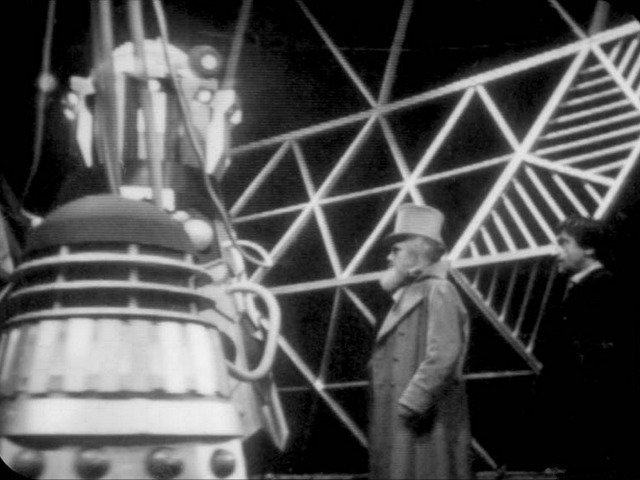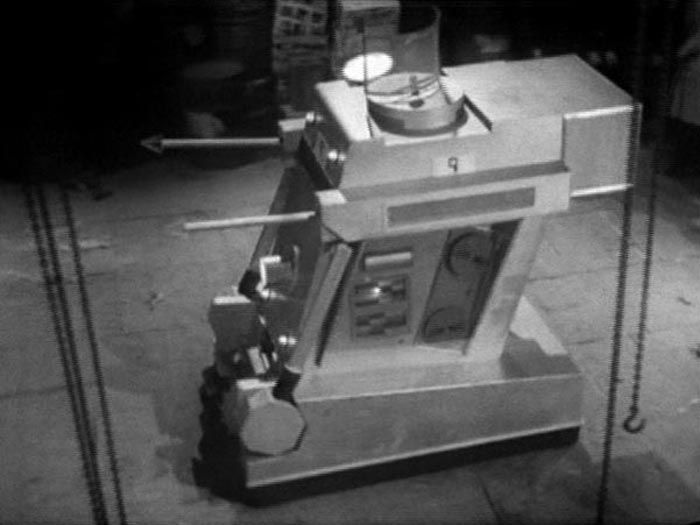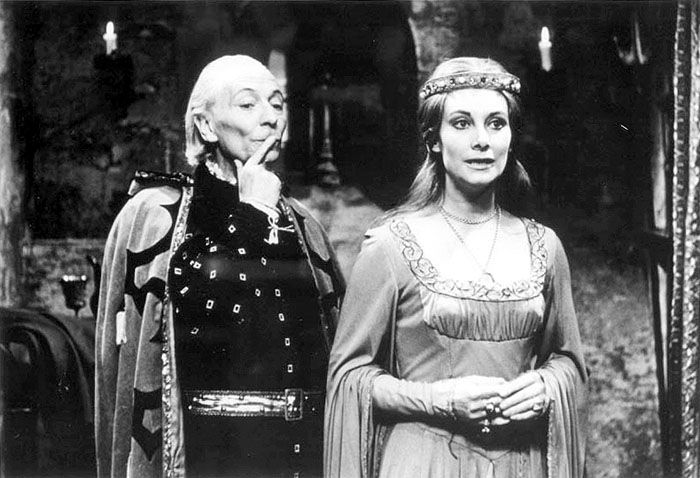Everything Human Has Been Purged (The Evil of the Daleks)
 It’s May 20th, 1967. Between now and July 1st, a department store in Brussels will burn down, killing 323, 72 will die in a plain crash in Stockport, 34 will die on board the USS Liberty in an accidental Israeli attack, and the Six Day War will happen, which result in a death toll on the order of 14-20,000. In addition Langston Hughes will die of complications from prostate cancer, both Dorothy Parker and Spencer Tracy will die of heart attacks, and the world will progress closer still to the eschaton. Also, The Evil of the Daleks airs.
It’s May 20th, 1967. Between now and July 1st, a department store in Brussels will burn down, killing 323, 72 will die in a plain crash in Stockport, 34 will die on board the USS Liberty in an accidental Israeli attack, and the Six Day War will happen, which result in a death toll on the order of 14-20,000. In addition Langston Hughes will die of complications from prostate cancer, both Dorothy Parker and Spencer Tracy will die of heart attacks, and the world will progress closer still to the eschaton. Also, The Evil of the Daleks airs.
For a certain brand of mysticism-obsessed Doctor Who critic that views the show mostly as an excuse to talk about mirrors (and occasionally chairs), The Evil of the Daleks forms something of an apex for the series. And this is entirely fair enough—it’s one of the most overtly magically-focused stories in Doctor Who history, featuring an antagonist whose motivation is literally “I want to do alchemy.” But in their rush to celebrate its magical weirdness there’s a frustrating failure to look with any depth or care at the precise details of what spell the show is weaving here.
Let’s consider Philip Sandifer’s essay on the subject, in which he contrives to read the story in terms of David Whitaker’s larger alchemical project in which the Doctor defeats the Daleks through his mercurial sorcery. Sandifer is very gung ho about this, spinning out an extended alchemical metaphor out of this, Whitaker’s other stories, and occasionally stories Whitaker had only a partial hand in crafting. Sandifer is here cribbing from Miles and Wood’s entertaining essay “What Planet is David Whitaker” on, and the reading makes a certain amount of sense when applied to Whitaker’s ouvre as a whole. But The Evil of the Daleks is a puzzling place for Sandifer to make his grand stand for Whitaker’s alchemical master plan for Doctor Who. The story features an alchemist, yes, but what Sandifer seems to miss is that he’s the bad guy, and his desire to transmute lead into gold is mad folly. As for mercury, Sandifer’s essay uses the word “mercury” seven times, which is, as it happens, exactly seven more times than David Whitaker’s script for The Evil of the Daleks. Simply put, this rather complicates any efforts to claim that the story is about it, and sentimental references to Whitaker’s larger ouvre don’t actually paper over the gap.
This is not to say that there is no magic involved in this story; it’s just that reading it as a utopian parable about the inventive powers of mercury is wishful thinking. Let’s instead look at what actually is in the story: the distillation of the human and Dalek factors. These are framed clearly as alchemical opposites, with the Dalek factor being found in the negative space of the human factor much as Troughton’s Doctor found himself in the negative space of the Daleks in their last story.…

 It’s June 25th, 1966. Between now and July 16th, a three-year-old girl will die at the Henry Vilas Zoo in Madison, Wisconsin after crawling under a restraining fence and being pulled into an elephant cage. Hundreds will die across the midwestern United States in a six-day heat wave, including 149 in St. Louis, and as many as 650 in new York City. Eight student nurses will die in Chicago when Richard Speck breaks into a dormitory and strangles them. This is in addition to numerous deaths in the Vietnam War, the deaths of Polish poet Jan Brzechwa, French painter Julie Manet, and the world edging ever closer to the eschaton. Also, The War Machines airs.
It’s June 25th, 1966. Between now and July 16th, a three-year-old girl will die at the Henry Vilas Zoo in Madison, Wisconsin after crawling under a restraining fence and being pulled into an elephant cage. Hundreds will die across the midwestern United States in a six-day heat wave, including 149 in St. Louis, and as many as 650 in new York City. Eight student nurses will die in Chicago when Richard Speck breaks into a dormitory and strangles them. This is in addition to numerous deaths in the Vietnam War, the deaths of Polish poet Jan Brzechwa, French painter Julie Manet, and the world edging ever closer to the eschaton. Also, The War Machines airs.
 CW: Rape
CW: Rape It’s March 27th, 1965. Between now and April 17th, 470 people will die in a dam burst and landslide in Chile, 20 will die when a car bomb is detonated outside the US embassy in Saigon, two will die when the first aircraft lost in air-to-air combat during the Vietnam War are shot down during a strike on the Thanh Hóa Bridge, and somewhere north of 250 people will die in the Midwestern United States in what are called the Palm Sunday Tornadoes, while Richard Hickock and Perry Smith will be executed by hanging for the murders of the Herbert Clutter family, Princess Mary wll die of a heart attack on the grounds of her estate at Harewood House, and the world will edge incrementally closer to the eschaton. Also, The Crusade airs.
It’s March 27th, 1965. Between now and April 17th, 470 people will die in a dam burst and landslide in Chile, 20 will die when a car bomb is detonated outside the US embassy in Saigon, two will die when the first aircraft lost in air-to-air combat during the Vietnam War are shot down during a strike on the Thanh Hóa Bridge, and somewhere north of 250 people will die in the Midwestern United States in what are called the Palm Sunday Tornadoes, while Richard Hickock and Perry Smith will be executed by hanging for the murders of the Herbert Clutter family, Princess Mary wll die of a heart attack on the grounds of her estate at Harewood House, and the world will edge incrementally closer to the eschaton. Also, The Crusade airs. Song for Eric (demo, 1990)
Song for Eric (demo, 1990) It’s December 21st, 1963. Between now and February 1st, 1964 128 people will die in a cruise ship fire north of Madeira, 25 people will die in riots in the Panama Canal Zone, 100 will die in anti-Muslim riots in Calcutta, three will die when an American fighter jet accidentally strays into East German space and is shot down, while Pamela Johnson will be murdered in Manchester, New Hampshire, T.H. White will die of heart failure, and the world will edge incrementally closer to the eschaton. Also, The Daleks will air on television.
It’s December 21st, 1963. Between now and February 1st, 1964 128 people will die in a cruise ship fire north of Madeira, 25 people will die in riots in the Panama Canal Zone, 100 will die in anti-Muslim riots in Calcutta, three will die when an American fighter jet accidentally strays into East German space and is shot down, while Pamela Johnson will be murdered in Manchester, New Hampshire, T.H. White will die of heart failure, and the world will edge incrementally closer to the eschaton. Also, The Daleks will air on television. Tear in Your Hand (1992)
Tear in Your Hand (1992)